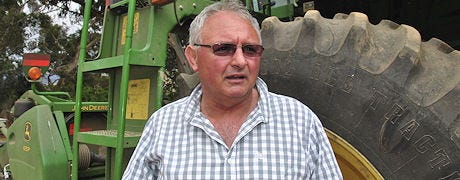
Farmers everywhere face risk. But what if you had to farm not knowing if the land you owned would be taken away from you tomorrow?
That's what's happening to some South African farmers today. The South African government has a policy called Land Reform, and the goal is to get 30% of farmland into black African ownership. In 1994, at the end of apartheid, almost 90% of the land in South Africa was owned by white South Africans, who make up less than 10% of the population. The government led by the African National Congress (ANC) vowed to redistribute land, but implementing land reform policies has been a struggle.

“We are still uncertain about what will happen in the future," says Thys Roux, a grain and sheep farmer in Western Cape Province, South Africa.
The law is, in effect, an effort to right the wrongs that took place during apartheid and to some degree, years earlier during colonialism. European explorers came to South Africa 300 years ago, often marginalizing local tribes. In 1948 the Euro-centric National Party came to power and enforced a series of harsh laws that stripped black South Africans of most of their basic human rights. This outraged black African societies; eventually the government was forced to hold democratic elections which led to the freeing and election of Nelson Mandela in 1994.
During our recent Farm Futures tour to South Africa we learned the government wants to pass new rules to extend the deadline for restitution claims through 2018 and allow a broader range of claims to be lodged.
If a native African can supply proof his or her ancestors were buried on the land or that the family held it in control before 1910 – the year apartheid was established - they can sue the government to gain ownership. If the claimant wins, the landowner must sell that land to the government, and the land is given to the claimant.
Even if the claim is dubious, the white farm owner will find it difficult to get capital or loans as long as land ownership is in doubt, says Gerrit Roos, a 48-year-old farmer who hopes to pass his 7,500-acre farm on to his two sons someday. "The government is chasing the white farmers away," he says.
In addition, South African law holds that if a black farm worker occupies one of the farm owner's tenant houses for 10 years, they own the house. That rule does not apply if the worker is white.
Law backfires
Like so many government policies, South Africa's land reform law can and often does, backfire. Newly-minted black owners usually have neither the skills or desire to become farmers.
"The government gives land to blacks and gets a white farmer to teach them to farm, and sometimes it works and sometimes it doesn't," Roos says. "The new owner is often unprepared for the capital and equipment needed to farm the land; within a year or two the land ends up back in government hands and the original farmer buys it at a discount."
Land reform means "we are still uncertain about what will happen in the future," says Thys Roux, a grain and sheep farmer in Western Cape Province. "One thing we try to tell the government is, food production must be sustainable. If there's no food then what happened in Zimbabwe will happen here. There were land claims mostly in the north and people were removed from their land and taken over by black farmers, not with great results.
"Most of the farms that have been given back to black farmers, the results have not been great," Roux says. "It would be like making me a doctor – you put me in surgery and I'd kill the patients. That's what's happening when land is given back to people who win claims in court."
Now, just imagine if the same scenario played out here in North America, where Europeans displaced native Americans years ago. Food for thought? You betcha!
About the Author(s)
You May Also Like






